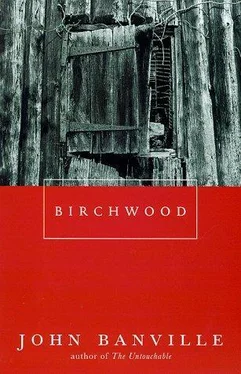Michael, of course, wanted to be squire, to ride on a black horse around his land and hunt the foxes and thrash the peasants. He wanted all that I had, and hated me for having it and despising it. I think he would have killed me, willingly, it would have been so easy, but something held him back, that same something which stayed the knife in my own hand when we faced each other in the murderous dark of the summerhouse, and so, instead of fratricide, he played with Martha her sly game, and between them they sent me off in search of a sister. But by then all that was Birchwood had collapsed, the Lawlesses were taking over, and Michael too had to fly. Wherever I went he was ahead of me, dogging the steps I had not taken yet. He found the circus, and joined the Molly Maguires, brought them to fight the Lawlesses, and the circus to fight the Mollies. All that blood! That slaughter! And for what? For the same reason that Papa released his father into the birch wood to die, that Granny Godkin tormented poor mad Beatrice, that Beatrice made Martha believe that Michael was in the burning shed, the same reason that brought about all their absurd tragedies, the reason which does not have a name. So here then is an ending, of a kind, to my story. It may not have been like that, any of it. I invent, necessarily.
The weather held for weeks, limpid and bright, wind all day, sun and rain and a luminous lilac glow above the trees, then the evenings, night and stars. At first the silence troubled me, until I realised that it was not really silence. A band of old women came one day and took away the bodies of the dead men down in the field. I watched from my window, fascinated. I wanted to go and help them, to say, Look, I am not my father , I am something different but they would have run away from me, horrified. The poppies languished. I worked on the house, cleared out the attic, boarded up the windows smashed during the siege, tended the flowerbeds, I do not know why. The summerhouse was invaded by pigeons, starlings, a hive of bees. I let them stay there. They were alive, and I had enough of death. Perhaps I shall leave here. Where would I go? Is that why they all fought so hard for Birchwood, because there was nowhere else for them to be? Outside is destruction and decay. I do not speak the language of this wild country. I shall stay here, alone, and live a life different from any the house has ever known. Yes.
The kitchen still bore traces of Josie's peculiar odour. I wondered if she had been a part of those rights which Cotter had come back to claim. I doubt it. She had slipped into a crevice in time and lain there until forgotten. I could no longer remember what she looked like. How many have I lost that way? I began to write, as a means of finding them again, and thought that at last I had discovered a form which would contain and order all my losses. I was wrong. There is no form, no order, only echoes and coincidences, sleight of hand, dark laughter. I accept it.
Spring has come again, St Brigid's day, right on time. The harmony of the seasons mocks me. I spend hours watching the sky, the lake, the enormous sea. This world. I feel that if I could understand it I might then begin to understand the creatures who inhabit it. But I do not understand it. I find the world always odd, but odder still, I suppose, is the fact that I find it so, for what are the eternal verities by which I measure these temporal aberrations? Intimations abound, but they are felt only, and words fail to transfix them. Anyway, some secrets are not to be disclosed under pain of who knows what retribution, and whereof I cannot speak, thereof I must be silent.

John Banville was born in Wexford, Ireland, in 1945. The author of thirteen previous novels, he has been the recipient of the James Tait Black Memorial Prize, the Guardian Fiction Prize, a Lannan Literary Award for Fiction, and, most recently, the Man Booker Prize. He lives in Dublin.
***















